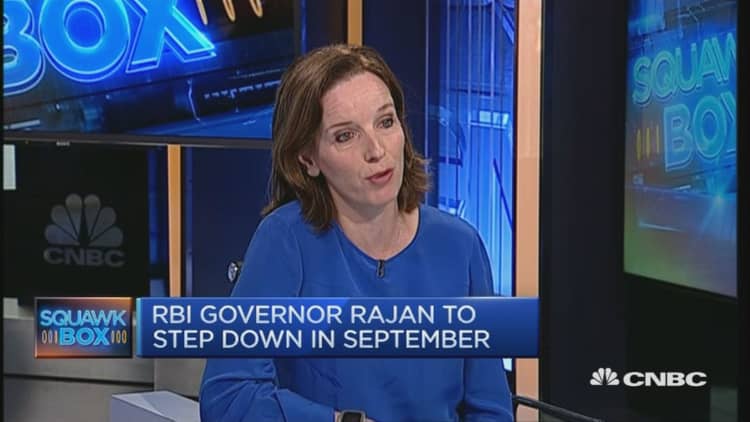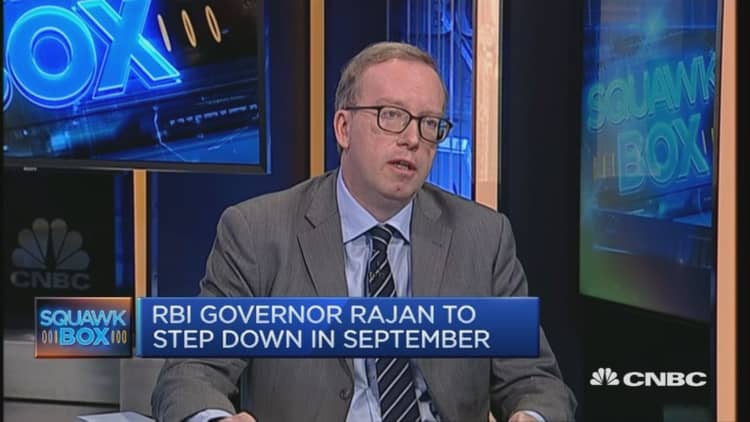

The sudden decision to step down by the man deemed by many to be the world's best central banker has raised doubts over the Indian government's commitment to structural reforms, as well as India's position as a harbor of safety amid troubles in other emerging markets.
Reserve Bank of India (RBI) chief Raghuram Rajan announced at the weekend that he would not seek a second term when his three-year reign ended in September, and would return to academia instead.
Rajan, a former chief economist at the International Monetary Fund, has earned rockstar status in the financial industry for his achievements, which include lowering runaway consumer prices and stabilizing the exchange rate.
"When Rajan took the helm in September 2013, the economy was declining at an annualized rate of 2 percent on quarter, consumer prices were soaring 9.8 percent, the rupee was down 16.6 percent from the year earlier, and the current account deficit was estimated at 4 percent of GDP," independent analyst and CNBC columnist Michael Ivanovitch said. "He is now leaving an economy growing at a rate of 9.6 percent, inflation is down to 5.8 percent, the rupee lost only 4.7 percent from its year-earlier level, and the estimated current account deficit is about 1 percent of GDP."
Famously gloomy investor Marc Faber has reportedly called Rajan "the only central banker I trust," while another high-profile investor, Jim Rogers, has described him as "probably the best central banker in the world."
Despite tangible success and external plaudits, Rajan has faced mounting criticism from conservative members of Prime Minister Narendra Modi's ruling Bharatiya Janata Party (BJP).
Here, we explain his disagreements with certain BJP officials and what his departure means for a country aspiring to become a driver of the global economy .
BJP vs Rajan
During his first two years, Rajan's aggressive bet on high interest rates amid double-digit consumer price inflation (CPI) sparked anger from politicians, who wanted lower rates to pull the country of a deep economic slowdown. The BJP party rode to power in 2014 on the promise of bolstering growth, attracting foreign investment and providing jobs as annual GDP growth sank below 5 percent in the 2012-2013 and 2013-2014 financial years.
Tighter monetary policy as well as a decline in commodity prices helped tame inflation, leading the central bank to cut interest rates by more than 150 basis points since the start of 2015.
But the issue wasn't just rates. The 53-year old Rajan asked banks, whose lending decisions have been partly influenced by politics, to clean up their books. He has also been an outspoken critic of the government's management of social issues, particularly crony capitalism, corrupt police, and religious violence. "Perhaps the system tolerates corruption because the street smart politician is better at making the wheels of the bureaucracy creak, however slowly, in favor of his constituents," he said in a 2014 speech.
Resentment has boiled among BJP hardliners over the years, particularly parliament member Subramanian Swamy. In May, Swamy urged Modi to sack Rajan, stating that high rates had resulted in a "collapse of industry and rise of unemployment in the economy." Rajan's foreign-educated background also became an issue. "He is in this country on a Green Card provided by the U.S. government and therefore mentally not fully Indian," Swamy said in May.
Modi's administration has stayed quiet on the attacks.
Despite the political noise, many market participants expected Rajan to continue for another term. He'll be the first RBI governor since the early 90s to only serve a three-year term. "The proverbial ball is on the government's court to make a case as to why his tenure wasn't extended," explained Mizuho Bank economists on Monday.
But others said his departure wasn't entirely a shocker. "It [Rajan's resignation] isn't surprising, to judge from speculation over several weeks of shilly-shallying by Narendra Modi which already had some market participants fearing Rajan's departure," noted Alastair Newton, co-founder and director of Alavan Business Advisory.
Major implications
One of the most unnerving consequences of Rajan's decision is the growing influence of government over monetary policy, an area meant to be independent from political pressure, according to strategists.
"The issue is not so much about a pre-eminent economist/central banker being denied a renewal of term (often assumed to be a given). Rather it has to do with the government's implicit signals on central bankers deemed to have a strong independent streak," said Mizuho Bank.
Moreover, Rajan's exit comes at a time foreign investor confidence in New Delhi has been eroded amid a lack of substantial progress on key structural challenges in the two years since Modi assumed power. Injecting liquidity into distressed public banks, implementing a goods-and-service (GST) tax and land acquisition are some of the biggest issues that remain unresolved.
"It [Rajan's departure] begs serious questions over the government's commitment to reform at a time when there are already real doubts about Modi's ability to deliver (on which expectations were unreasonably high at the time of the general election but where the general consensus is that he has fallen short by any reasonable measure)," said Newton.
Then there's also the question of the reforms initiated under Rajan. Can they continue without the charismatic chief?
He has to a great extent institutionalized enough change to ensure smooth continuity under his successor, particularly his 2015 decision to adopt inflation targeting as a guide to monetary policy and the ongoing clean-up of bad loans among Indian banks, said Tai Hui, chief Asia market strategist at J.P. Morgan Asset Management.
The problem isn't so much the new successor, but the fractured state of Indian politics, Hui explained.
"Will politics unwind some of this progress? The question is Modi willing to continue [Rajan's reforms]? The answer should be yes but the domestic situation in India is a question."
This isn't an India-specific problem either, Hui pointed out. All around the world, domestic politics are impeding the policies of monetary officials.
"Central bankers in Japan, Europe have pushed all the buttons they can to keep the economy going but at the same time, there's political riffraff that's sandbagging much-needed reforms. Central banks around the world have done a lot to stabilize growth but governments need to pick up the baton and run with it."
Who will be his successor?
The government hasn't announced any details on the process or timeline of Rajan's successor but there are seven candidates on the list, Reuters reported on Sunday, citing an unnamed official.
Among the names are deputy RBI governor Urjit Patel and Arundhati Bhattacharya, chair of State Bank of India-the country's largest lender. Others include RBI veteran and current IMF executive Subir Gokarn and Rakesh Mohan, a former RBI deputy governor.
"Maintaining continuity in central bank stance is a key metric of a stable economy. We think that some of the changes brought in by Rajan are irreversible. However, the new governor might have different views on appropriate level of real interest rate, pace of attaining the 4 percent target given growth considerations and liquidity management framework," said Citi economists in a recent note.
On the bright side, the new chief will be facing a relatively stable landscape amid subdued Indian inflation and as the dollar's rally loses steam, said J.P Morgan's Hui.
Since Rajan's departure will likely impact critical banking sector clean-up and stifle criticisms of crony capitalism, the new governor will have to do more than merely control inflation in order to reinstate market confidence, warned Mizuho Bank.
Market impact
Analysts widely agree that uncertainty will hit Indian markets. In what may be an early indicator of market turmoil, the rupee hit a one-month trough in the non-deliverable forwards market on Monday, Reuters said.
"While some knee-jerk reaction to this event is quite possible, we expect the markets to wait for more clarity on the new Governor's name and more importantly his views on continuity versus change. If the new governor is able to strike a right balance between the two then he will gain credibility and market focus is likely to shift back to improved macro fundamentals," said Citi.
For now, Indian asset markets will feel the "Rexit" risk premium being priced in, echoed Mizuho.

